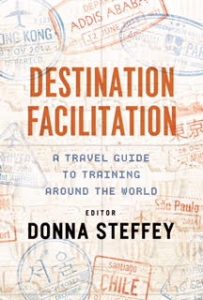Preview Thursday: Destination Facilitation

Best of Books, Inspiration
November 30, 2017
Ellen Snyder
Topics
Preview Thursday, Teamwork, Values, Vision The following excerpt is from the introduction of Destination Facilitation: A Travel Guide to Training Around the World edited by Donna Steffey.
The following excerpt is from the introduction of Destination Facilitation: A Travel Guide to Training Around the World edited by Donna Steffey.
The world seems to be getting smaller and more similar. Starbucks, McDonald’s, and a Disney store are in just about every corner of the world. It is easy to forget, with KFC in 125 countries, whether you are ordering food in Beijing, Bangalore, or Buenos Aires. People may enjoy the same foods, but that does not mean that the same techniques, language, sense of humor, and learning styles work everywhere.
Who would think that to call someone “sir”—a polite and respectful way of addressing a man in many cultures—would be wrong in Oman? Hamza Taqi, a trainer from Kuwait, was conducting a DiSC Communication workshop with a group of senior leaders in a prestigious government entity in Oman. One of the leaders asked for permission to speak. Hamza gestured with an open hand and said, “Please, sir.”
The room grew quiet and uncomfortable.
Participants looked at each other and shared awkward smiles. The person who asked to speak blushed and turned pink. Hamza had no idea what he had just said to change the mood and make his learners feel uncomfortable. During the break, Hamza asked what he had done wrong. A participant informed Hamza that the title sir was used only for a member of the royal family. A title of respect that Hamza showed to all his students across the globe did not work in Oman.
But knowing a list of protocols to follow and the taboos to sidestep in each country is not enough to help avoid international miscommunications and awkwardness. Nor is knowledge of different cultures sufficient information to create a positive learning environment for knowledge transfer to occur. It is important to be open to feedback when working internationally to notice the “awkwardness” of a situation and make adjustments.
David Livermore, president of the Cultural Intelligence Center in East Lansing, Michigan, and author of 10 books on global leadership is an expert on the topic of global mindset or “cultural intelligence” (CQ) as he refers to it. He defines CQ as “the capability to function effectively in a variety of cultural contexts including national, ethnic, organizational and generational” (Livermore 2011). He has worked with leaders in more than 100 countries and surveyed more than 50,000 people from every major industry and region of the world on the topic of CQ (Ang and Van Dyne 2008, 3). He used this information to create a model for better understanding global mindset or CQ (henceforth, we will use the terms interchangeably)—a set of competencies to be taught, developed, and measured. The CQ model is a new tool for approaching cultural sensitivity, racism, and cross-border effectiveness and discovering what unites us as people rather than separates us.
 Donna Steffey, MBA, CPLP, President of Vital Signs Consulting, is an international trainer, author, facilitator of the ATD Master Trainer™ Program and adjunct faculty at Lake Forest Graduate School of Management. Donna has designed and delivered programs to global audiences in 25 countries. She uses her platform experience to educate, inspire, and coach helping organizations achieve their desired business results.
Donna Steffey, MBA, CPLP, President of Vital Signs Consulting, is an international trainer, author, facilitator of the ATD Master Trainer™ Program and adjunct faculty at Lake Forest Graduate School of Management. Donna has designed and delivered programs to global audiences in 25 countries. She uses her platform experience to educate, inspire, and coach helping organizations achieve their desired business results.
Donna is certified to deliver Cultural Intelligence assessment and workshops and the EQi, an Emotional Intelligence Assessment as well as various personality assessments. Learn More







